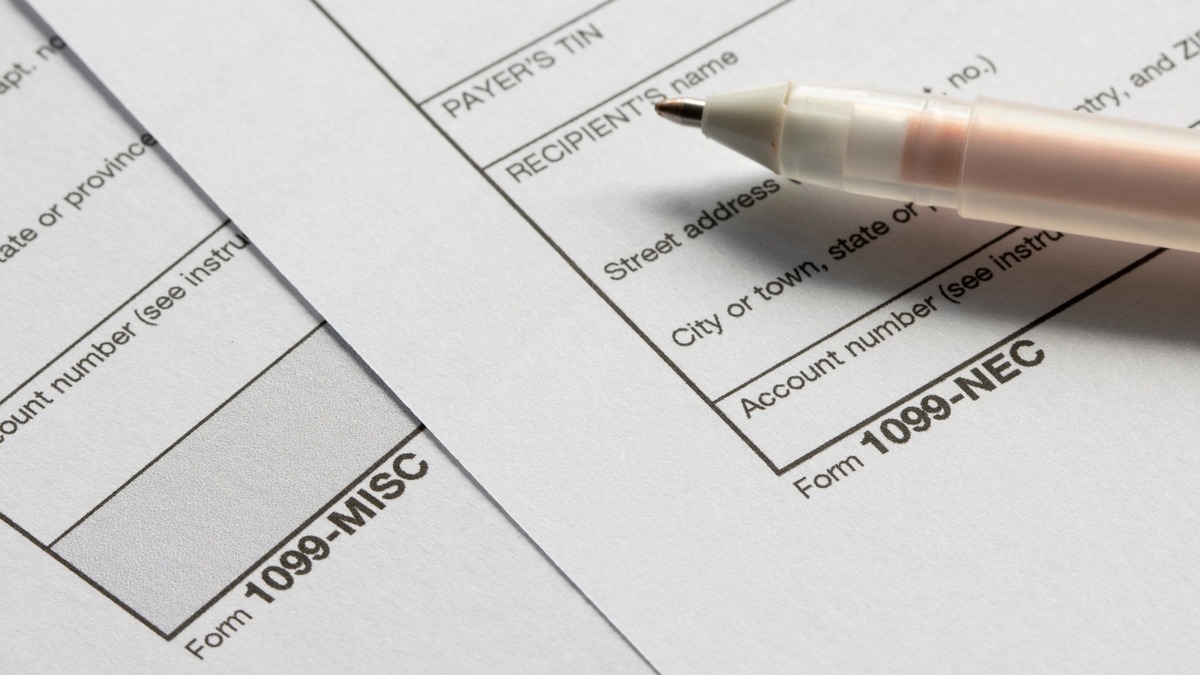The difference between 1099-MISC and 1099-NEC
The 1099 is a group of Internal Revenue Service forms used to report income payments for tax preparation and filing. 1099 forms are used for freelancers and independent contractors, providing details about non-employee compensation received in a given year. To receive a Form 1099, a worker must first have a W-9 that indicates their contact information, taxpayer identification or employer identification number and business structure. (Find out more about starting an independent contractor business.)
While there are different kinds of 1099 forms, the 1099-NEC and 1099-MISC are among the most common. Form 1099-NEC is for businesses to file for independent contractors they engage for the purpose of reporting non-employee compensation. These would be payments the company makes that are generally subject to self-employment tax - a tax paid by the independent contractor themselves vs. the hiring company. Before 2020, the Form 1099-MISC was used to report income of taxpayers who are not employees, including independent contractors; now, the Form 1099-MISC is used to report certain types of miscellaneous payments, such as rents, prizes, and awards, healthcare payments, and payments to an attorney.
Did you know?
Independent contractors operating as S- or C- corporations generally do not receive a 1099-NEC form.
Do I use 1099-MISC or 1099-NEC?
If you are an independent contractor (i.e., self-employed) who provided services worth $600 or more to an individual business in the last tax year, the company will provide you with Form 1099-NEC. This form is generally for any freelancer or independent contractor who is not an employee of that business, and the contractor is responsible for paying self-employment taxes.
If you are part of a C- or S-Corp (or an LLC taxed as an S- or a C-Corp), you generally will NOT receive or need a 1099-NEC form.
Keep in mind that you’ll only receive a 1099-NEC if you’re providing services to a business entity, but not if you were hired privately. Let’s say you’re a professional photographer who’s been hired to take wedding photographs by an old friend of yours. You’ve agreed on a fee of $2,000. The friend who hires you doesn’t need to provide you with a 1099-NEC form, but you will still need to report the income earned on your taxes.
On the other hand, if a wedding planner hires you for the engagement and the wedding planner is operating as a business, then the business will need to file and send you a Form 1099-NEC because your compensation is greater than $600 for the year.

Instructions for Form 1099-MISC
The IRS states that businesses must file Form 1099-MISC, which stands for Miscellaneous Information, for every person paid any of the following during the tax year in question:
At least $10 in royalties or broker payments in lieu of dividends or tax-exempt interest
At least $600 in:
Rents
Prizes and awards
Other income payments
Generally, the cash paid from a notional principal contract to an individual, partnership, or estate
Any fishing boat proceeds
Medical and health care payments
Crop insurance proceeds
Gross proceeds paid to an attorney
Section 409A deferrals
Non-qualified deferred compensation
A portion of Section 409A deferrals and non-qualified deferred compensation may need to be reported on the Form 1099-MISC. The IRS also reminds independent contractors to use Form 1099-MISC to report direct sales of at least $5,000 worth of consumer products to a buyer for resale anywhere other than a permanent retail establishment. Get more instructions for Form 1099-MISC and 1099-NEC.
Instructions for Form 1099-NEC
The IRS states that businesses must file Form 1099-NEC, which stands for Non-employee Compensation, for every person paid at least $600 during the tax year in question. Examples of payments include services performed by someone who is not their employee (including parts and materials) and payments to an attorney.
Get more instructions for Form 1099-MISC and 1099-NEC.
Who does not get a 1099-NEC form?
Independent contractors or vendors, including LLCs and partnerships operating as S or C corporations, do not receive a 1099-NEC or 1099-MISC form. Only unincorporated independent contractors receive these forms. Sellers of freight, merchandise, storage or similar items also do not receive 1099-NEC forms. More on 1099 exemptions.
Does 1099-NEC replace 1099-MISC?
No, the 1099-NEC does not replace the 1099-MISC. Neither are they identical forms. Since 2020, the 1099-NEC has been reintroduced in order to separate non-employee compensation reporting from the miscellaneous income form. This is because having all miscellaneous income combined with non-employee compensation on one form has caused a lot of confusion for tax-filers.
1099-NEC and 1099-MISC deadlines
1099-NEC forms must be filed and furnished by January 31. Keep in mind your state may also require 1099-NEC filing. 1099-MISC paper forms must be filed and furnished by February 28, or you can file electronically by March 31.
Independent contractors don’t need to include the 1099 form when filing taxes. As long as you know how much income you have received from individual businesses (i.e., clients, vendors) during the tax year, you can still accurately report your income. Note that you are still responsible for reporting all income even if you do not receive a 1099 (because your payments were under the $600 threshold).
For businesses filing 1099s, Copy A goes to the IRS while Copy B goes to the independent contractor.
An independent contractor management system like WorkMarket can help alleviate business tax filing hassles by furnishing 1099-NEC forms to workers and filing them with the IRS and applicable state agencies
Realize the full potential of independent contracting today. Contact us to learn more.



